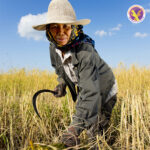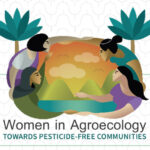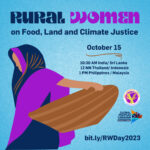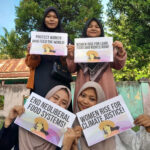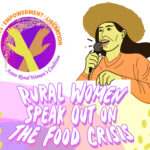World Hunger Day: #ZeroHunger is possible with food sovereignty, agroecology and people’s right to development

Today, October 16, the world led by the Food and Agriculture Organization (FAO) is celebrating the World Food Day under the theme “A #ZeroHunger world by 2030 is possible”. But for many people, most ironically those who directly produce the world’s food, there is nothing to celebrate. For them, what should be marked today instead is “World Hunger Day” to protest the grim reality faced by countless families around the world, especially in the poor countries and in the rural areas.
A zero hunger world is possible; but not under the current food and agriculture development paradigm that is dominated by big corporations and their harmful technologies such as agrochemicals and genetic engineering; one that puts a premium on market and profits over people and planet; and one that has perpetuated hunger, poverty and exclusion of the majority.
Hunger today is less about the lack of food but more about the systemic deprivation of food that the world could actually produce in abundance. What needs to be done is to dismantle the monopoly control over food, land and market by big private capital; uphold the food sovereignty and right to development of peoples everywhere; implement genuine agrarian reform; and promote agroecological systems as the sustainable and healthier systems of food production.
In the 16 days leading up to the World Food Day, PAN Asia Pacific (PANAP) and 40 of its partner organisations from 20 countries have highlighted the need for agroecology and the role of the youth in its promotion through the 16 Days of Global Action on Agroecology 2018.
At the same time, however, it must be stressed that agroecology will only truly prosper if the people’s food sovereignty, including the people’s rights to land and resources, is respected and advanced. The potential of agroecology as an alternative and sustainable food production system is fundamentally undermined, if not practically made impossible, under the prevalent corporate agriculture.
In the current global market economy, food and the land in which they are grown, are seen as commodity and sources of profits, in particular by the transnational corporations (TNCs) and even by governments. Food and land have become the subjects of the obsolescent neoliberal policies of privatisation (such as of infrastructure for agricultural production), deregulation (in particular of prices) and liberalisation of agricultural trade and investments that multilateral institutions such as the International Monetary Fund (IMF), the World Bank Group, and the World Trade Organization (WTO) as well as new and emerging regional free trade agreements (FTAs) perpetuate.
The promise of development and progress that the imposition of neoliberal policies will bring about has been a lie. After more than four decades of neoliberal restructuring of food and agriculture that will supposedly address global food insecurity, the FAO itself reports that the number of hungry people has been continuously rising. As of 2017, around 821 million people are facing chronic food deprivation, up from about 804 million in 2016 and from about 784 million in 2015 and 2014.
It is alarming that instead of reviewing and reversing the neoliberal policies in food and agriculture, global policy makers led by the IMF-World Bank and the multilateral and regional FTAs are using initiatives such as “zero hunger” which is Goal 2 of the Sustainable Development Goals (SDGs) to carry on these harmful and flawed programs. To supposedly bridge the gap in development finance required by the SDGs, including the goal on ending hunger, these powerful institutions are promoting greater corporate investments in food and agriculture at the expense as usual of poor farmers and other small food producers.
This relentless and systematic corporatisation of agriculture has condemned farmers, farm workers, fisherfolk, indigenous peoples, and other small food producers and rural sectors including women and children, to a life of perpetual poverty, hunger and marginalisation.
Worse, not only is the plight of the poor, hungry and landless remain unheard and unanswered; but legitimate expressions of their grievances and assertion of their right to food and land are met with violence and repression. Rural communities that demand state support and protection; that resist land and resource grabbing; and that push for pro-people agricultural development are often met with state-sponsored violence including harassment, arrests, and in some cases even extrajudicial killings.
Chronic hunger and food crises are preventable. Governments, especially in Asia, Africa and Latin America where majority of the populations are rural and whose livelihoods and lives are tied to land, and where hunger and poverty are concentrated, should stop subscribing to the destructive and corporatised “development” strategies prescribed by the champions of the neoliberal global market. Instead, global and national policy makers should heed the peoples’ legitimate demand for the protection and promotion of their access to and control over their land and resources; of their food sovereignty; and of their right to genuine development. ###
List of organisations and individuals who endorsed this statement.



